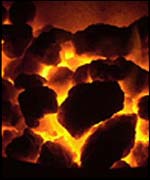Economics and the Environment, Part 1
 Sometimes the ways in which we describe economic activities do not provide a clear understanding of what it is we're doing. For instance, if we wish to be precise, we wouldn't use the phrase "energy production." Most of what we call "energy production" involves burning something. A ton of coal is an asset. Smoke coming out a smokestack is not an asset. Setting fire to an asset is not production. It can be economically useful by keeping us warm or converting iron ore to steel, but it is not, strictly speaking, production, defined as the creation of an asset.
Sometimes the ways in which we describe economic activities do not provide a clear understanding of what it is we're doing. For instance, if we wish to be precise, we wouldn't use the phrase "energy production." Most of what we call "energy production" involves burning something. A ton of coal is an asset. Smoke coming out a smokestack is not an asset. Setting fire to an asset is not production. It can be economically useful by keeping us warm or converting iron ore to steel, but it is not, strictly speaking, production, defined as the creation of an asset.This simple rephrasing of what happens when we light a fire leads to useful insights into economics and the environment. Consider the similar phrase, "timber production." A tree standing in a forest may not be considered to have any economic value. But when a logger cuts down the tree, it becomes an asset as soon as it hits the ground and is hauled off to the lumber mill.
Understanding that it is a fallacy to say that an asset can be created when something is destroyed suggests that we need to look more closely at the assumptions underlying the way we think about economics and the environment.



0 Comments:
Post a Comment
<< Home